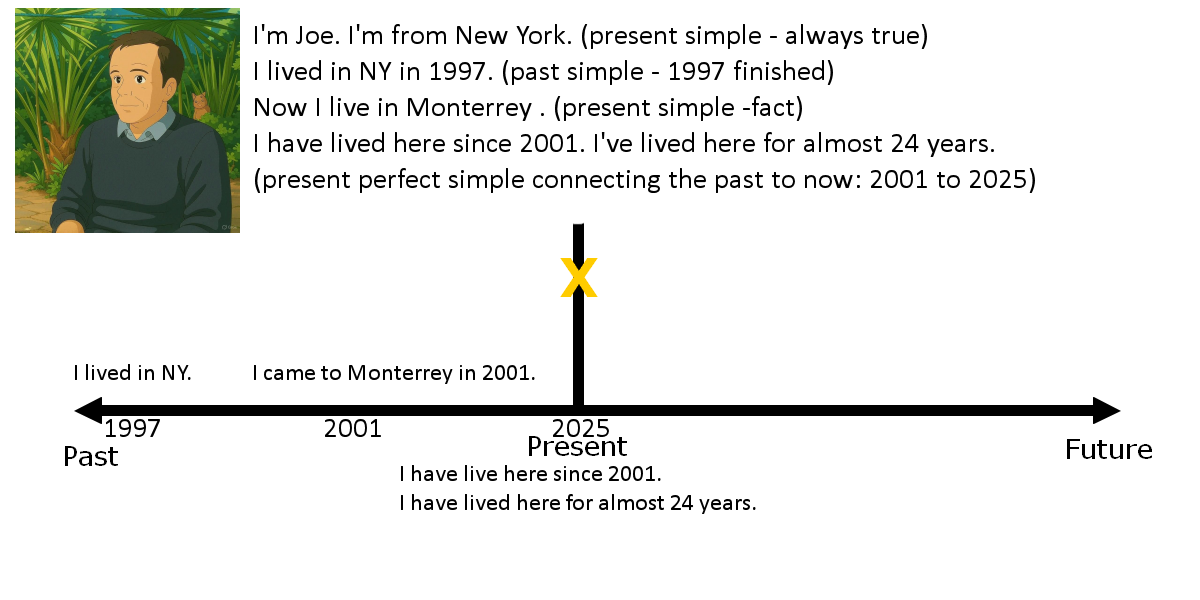Explanation of Present Perfect Simple for Beginners
Learn how to use the present perfect simple
Level 1
The lesson will help beginner students understand and use the present perfect simple tense in English to talk about actions that happened before now and are still important or affect the present, using simple examples like I have lost my keys or I have just eaten, and practicing with signal words like just, never, and already.
In English, the present perfect simple is a way to talk about things that:
- Happened before now (in the past).
- Are important now (they affect the present).
- Might still be going on or just finished.
In Mexican Spanish, you often use the pretérito (past tense, like *hablé* or *comí*) to talk about the past, and it’s clear when it happened. But in English, the present perfect (*I have spoken*, *I have eaten*) connects the past to right now. It’s not about *when* it happened, but the result or effect now.
It’s super easy! You use:
| I | have | I've |
| you | have | you've |
| he | has | he's |
| she | has | she's |
| it | has | it's |
| we | have | we've |
| they | have | they've |
Form:
| Subject | Have/has | Participle | Rest of the sentence |
| I | have | walked | to church. |
| She | has | walked | to school |
| He | has | walked | to the park. |
| It | has | walked | in the park. |
| We | have | walked | to the store |
| They | have | walked | on the beach. |
Regular verbs en in -ed in participle form.
Irregular verbs are irregular in participle form.
| Subject | Have/has | Participle | Rest of the sentence |
| I | have | eaten (eat) | today. |
| She | has | seen (see) | the movie. |
Negative: Add *not* after *have/has*
| Subject | Have/Has | Not | Participle | Rest of the question |
| She | has | not | eaten (eat) | today. |
| She | has | 'nt | eaten (eat) | today. |
| They | have | not | seen (see) | the movie. |
| They | have | 'nt | seen (see) | the movie. |
Questions: Put *have/has* at the start.
| Have/Has | Subject | Participle | Rest of the question |
| Have | you | eaten (eat) | today? |
| Has | she | seen (see) | the movie? |
|
1. Something you did, and it’s important NOW. - Another example: *She has finished her homework.* |
 |
|
2. Something you did recently (just finished). - Another example: *He has just called me.* |
 |
|
3. Something you did sometime before NOW (you don’t say when). - Another example: *She has seen that movie.*
|
 |
|
4. **Something that’s still happening (from the past to now).* - Another example: *I have studied English since 2023.* |
 |
-
In Mexican Spanish, you usually use:
- *Pretérito* (like *hablé* or *comí*) for things that are done and finished.
- *Presente* (like *hablo* or *acabo de* (like *acabo de hablar*) for things happening now or just now.
- Phrases like *ya* or *todavía no* to show if something is done.But in English present perfect tense (*I have spoken*) doesn’t care about *when* exactly it happened—it cares about the result or connection to now. That’s why it feels strange! It’s like saying, “This thing from before is still matters now.”
Examples to compare:
- Spanish: *Comí tacos ayer.* (I ate tacos yesterday.) → Use past simple in English: *I ate tacos yesterday.*)
- Spanish: *Ya comí tacos.* (I already ate tacos.) → Use present perfect in English: *I have eaten tacos.* (It’s done, and I’m full now!)
- Spanish: *Nunca fui a Estados Unidos.* → English: *I have never been to the United States.* (It’s part of my life experience now.)
These words often go with present perfect because they show a connection to now:
- just: Something happened a short time ago* (*e.g., *I have has just finished.*).
- already: It’s done * (*e.g., I *I have already done my homework.*).
- not yet: It’s not done * (*e.g., *I have hasn’t *not finished yet.*).
- ever: Did it happen at all? * (*e.g., Have *Have you you ever tried ceviche?* ceviche.*).
- never: It didn’t happen * (*e.g., I *I have never flown in a plane.*).
- since: When it started * (*e.g., I *I have been here since January.*).
- for: How long it’s been * (*e.g., *I have studied for one hour.*).
1. Think about NOW: If the action has an effect now or is still important, try *have/has + past participle*.
- Example: *I can’t find my book!* → *I have lost my book.*.
2. Don’t say “when”: If you want to say *when* it happened (e.g., yesterday, last week), use past simple (*I lost my book yesterday*), not present perfect).
3. Practice with “just” and “never”: These are easy signal words to start!
- *I have just finished this sentence.*
- *I have never tried sushi.*
4. Learn common irregular verbs: Verbs like *go (gone*), *eat (eaten*), *see (seen)* are used a lot. Start with these:
- *be → been*
- *do → done*
- *have → had*
- *go → gone*





Feynman
Hello everyone, I'm Feynman. Today I'm hoping to learn about a tricky but very useful part of English grammar: the Present Perfect tense, especially how to use 'Have you ever?'. I've invited Einstein to help explain these concepts to me.
Einstein
I'm happy to be here, Feynman. I'm Einstein, and I've been studying this guide on English grammar, specifically Unit 12, which covers the Present Perfect and its contrast with the Past Simple. This material helps clarify when to use 'Have you ever?' and other related phrases, and I'll try to explain it in simple terms.
Feynman
Great! So, 'Have you ever?' seems to be about experiences, right? Like, 'Have you ever been to Korea?' What's the core idea behind using this tense for experiences?
Einstein
That's a perfect start, Feynman! According to the guide, the Present Perfect, especially with 'ever,' is used to talk about life experiences at an unspecified time in the past. It's about whether something happened at any point up to now, not when it happened. So, 'Have you ever been to Korea?' asks if that experience is part of your life history.
Feynman
Okay, so it's about the existence of the experience, not the specific timing. But then, how does that differ from the Past Simple? Because if I went to Korea, that's also an experience, right?
Einstein
Excellent question, and it's a key distinction the guide highlights. If you ask 'Have you ever been to Korea?' and the answer is 'Yes,' the natural follow-up, if you want to know the specific time, is 'When did you go?' That's when you switch to the Past Simple. For example, 'Yes, we went there last summer.' The Past Simple is for completed actions at a definite time in the past.
Feynman
Ah, I see! So, 'Have you ever?' opens the door to the experience, and if we walk through it, we use the Past Simple to talk about the details of when it happened. It's like 'Have you ever read a book?' and then 'Which book did you read?'
Einstein
Precisely! The guide also mentions words like 'just,' 'yet,' 'ever,' and 'never' that often go with the Present Perfect. Can you think of how 'just' might be used?
Feynman
'Just' implies something happened very recently, right? Like, 'I've just finished my homework.' Is that correct?
Einstein
Spot on, Feynman! 'Just' means something happened in the recent past. The guide gives the example, 'We just finished lunch.' It emphasizes the recency of the action. And what about 'yet'?
Feynman
'Yet' is usually in negative sentences or questions, meaning something hasn't happened but is expected to. Like, 'I haven't eaten dinner yet.' Or, 'Have you finished your work yet?'
Einstein
You've got it! 'Yet' is used in negative sentences to show an action is not completed but will be, and it typically goes at the end of the sentence. The guide also points out common errors, like saying 'He's ever driven a car.' Why is that incorrect?
Feynman
Because 'ever' is for questions or with 'never' for negative statements. So, it should be 'Has he ever driven a car?' or 'He's never driven a car.' Is that it?
Einstein
Exactly! You've grasped the core rules. The guide also clarifies that 'never' is used for negative experiences, like 'I have never been to Botswana.' So, to summarize, the Present Perfect with 'ever' is for general life experiences, and the Past Simple is for specific events at a definite time. 'Just' for recent actions, and 'yet' for uncompleted actions, usually in negatives or questions.
Feynman
So, if I want to ask if someone has had an experience, I use 'Have you ever...?' If they say yes, and I want details, I switch to 'When did you...?' And 'just' and 'yet' tell me about the timing relative to now. I think I could explain this to someone else now! Thank you for explaining this so clearly, Einstein.
Einstein
You've summarized it perfectly, Feynman. That's exactly what makes the Feynman technique so powerful – if you can explain a complex concept in simple terms, you truly understand it. I'm glad I could help make this grammar concept more accessible.
¡Un regalo exclusivo para ti!
Haz clic en el botón de abajo y Joe te enviará esta lección en PowerPoint y PDF completamente gratis. Sin compromisos, recibirás ambos archivos directamente en tu WhatsApp. ¡Aprovecha esta oportunidad única ahora!
Mándame mi regalo¡Desbloquea tu Potencial en Inglés – Prueba una semana Clases GRATIS!
¿Te ha gustado nuestra rápida lección de inglés de 5 minutos? ¡Imagina lo que podrías lograr en una clase completa! Nos emociona ofrecerte una oportunidad exclusiva: ¡una clase de prueba GRATIS! Así es – experimenta todos los beneficios de nuestras lecciones envolventes sin **ninguna obligación** de tu parte.
¿Listo para dar el siguiente paso? Comienza tomando nuestro **EXAMEN DE UBICACIÓN en línea GRATIS** y descubre el nivel perfecto para ti. Esta es tu oportunidad para mejorar tus habilidades y aumentar tu confianza en inglés, todo mientras disfrutas de un ambiente de aprendizaje interactivo y de apoyo.
No te pierdas esta increíble oferta: ¡inscríbete hoy y descubre lo divertido y efectivo que puede ser aprender inglés!
Empieza aquí: Examen de Ubicación
Thank you for joining this quick lesson on 20 informal expressions commonly used in American business. Stay tuned for more bite-sized English lessons at 5-Minute English!
Happy studying!
